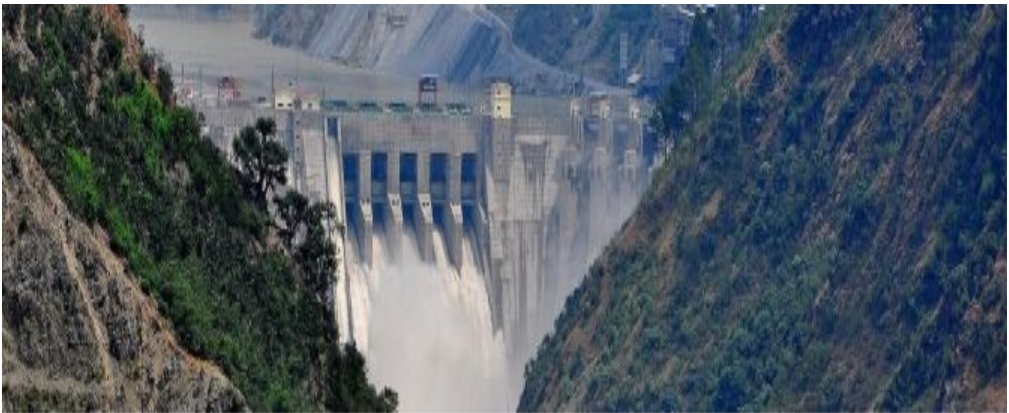Pakistan seems to be concerned regarding Indian ecological devastation due to New Dams

Ujh Hydroelectric dam in Jammu and Kashmir
The Government of India has approved the construction of seven hydropower dams in the Kishtwar region including projects in Rattle, Dul Hasti, Pakal Dul Project, Kiru, Kwar, Bursar, and Kirthai in the Union Territory of Jammu and Kashmir.
These dams will generate 5,190 megawatts of hydroelectricity as part of the effort to shift from coal to renewable energy. All care has been taken through detailed project studies so that the lush forests and valleys are not threatened by these the dams and the delicate flora and fauna are not damaged. The ways of life of semi-nomadic and farming communities will get further enhanced.
These dams will also have no impact on the region’s seismicity, silt discharge into the river, ambient air quality, local water sources and groundwater. It will also improve the overall water security of Jammu & Kashmir.
India has started work on four of the seven dams and till now there has been no adverse impact on environment and humans life has already started improving with hardly any displacement. Those displayed have been fully re settled and happy with their new environment. The power projects are coming up as planned and will bring immense benefit to the region.
While clearing and executing the Projects, India has been following every article and clause as per the Indus Water Treaty. In fact the treaty favours Pakistan. In 2003, even the State assembly of J& K had passed a resolution asking the Central Govt to annul the Indus Water Treaty as it gives undue benefits to Pakistan.
However Pakistan totally jealous of India’s progress first ran to the World Bank but it could not pressurize India because unlike Pakistan, India is not dependent on Western controlled World Bank loans. Next it asked for setting of a Court of arbitration. This too did not fructify. So now Pakistan has started worrying very loudly regarding ecological imbalances and how the projects are devastating the life of the locals in Jammu & Kashmir.
Pakistan keeps harping that the Chenab River flows into Kishtwar from Himachal Pradesh and then flows out to four other districts in Jammu and Kashmir and ultimately into Pakistan. As per Pakistan construction of any big dam poses ecological risks, and having seven dams close to each other will increase those risks beyond India to Pakistan.
As per them these dams can have impacts on Pakistan because by altering the flow of the Chenab, the dams could decrease the water available to Pakistani farmers. They say that control of the water of western rivers by India is in violation of the Indus Treaty. India is doing this under a well-thought strategy to render Pakistan’s link-canal system redundant & destroy the agriculture of Pakistan.
However facts are otherwise. The Treaty gave only 15% of the water for irrigation use by India and rest 85% to Pakistan. Though India is permitted to store water under unlimited run of the river hydro projects, which again flows into Pakistan only. In fact then Pakistan does not have to spend money and effort on construction of dams within its own area. However Jammu & Kashmir remains deprived of full irrigation potential of the rivers flowing through it.
Sixty-two years after signing the Indus Water treaty between India and Pakistan, it continues to survive despite three wars between India and Pakistan, several differences, and many conflicts. However, the true spirit of the treaty will die with the Pakistan reiterated time and again that India is building dams by violating the Indus Water treaty.
On 17th October 2022, the World Bank announced the launch of two parallel lawsuits to settle Pakistan’s concerns over two hydropower projects that violate the Indus Basin Treaty. World Bank is also setting an inquiry with the Court of Arbitration & Neutral expert over the India & Pakistan Indus treaty water dispute in Kishenganga and Ratle Hydroelectric power plants are surfacing. India objects to World Bank’s appointments on Indus Water Treaty.
World Bank will be shown its true place, if a fed up India just walks out of the Indus Water Treaty. All those powers controlling the World Bank will not be able to bend India …they can give it a try if they want.
These hydro projects will bring development to the region and also bring the prosperity. Pakistan is worried that seeing the prosperity, the people of illegal occupied POK will then themselves re merge with the Union of India and once again become part of Jammu & Kashmir.




